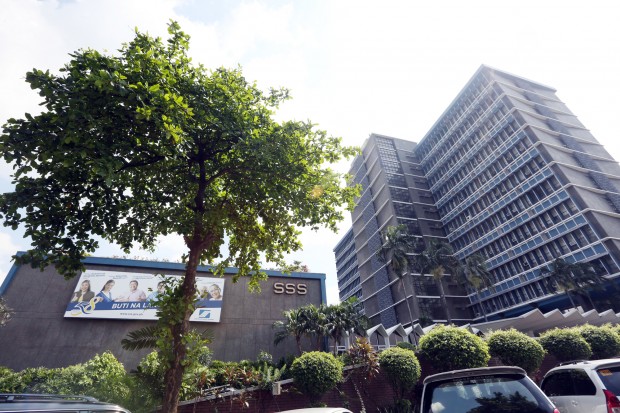
FILE PHOTO: The Social Security System Building on East Avenue in Quezon City. Photo taken January 18, 2016. INQUIRER/NIÑO JESUS ORBETA
MANILA, Philippines — Bona fide members of the Social Security System (SSS) who are required to undergo home quarantine due to COVID-19 infection are already covered by the state-run insurer’s Sickness Benefit Program.
According to SSS, members who are unable to work due to sickness or injury — including COVID-19 infection — and are confined either at a hospital or at home for over four days could avail of such benefit.
The same applies to overseas Filipino workers (OFW), it added.
“SSS explained that members who cannot work due to sickness or injury and are confined either in a hospital or at home for at least four days could avail of the sickness benefit. Aside from employed members, SSS also grants sickness benefits to self-employed, voluntary, and [OFW] members,” it said.
“The SSS Sickness Benefit Program is a daily cash allowance paid for the number of days a qualified member cannot work due to sickness or injury, including workers infected by COVID-19. Members can avail of up to a maximum of 120 days in sickness benefit in one (1) calendar year,” it added.
Qualified SSS members who would like to avail of the Sickness Benefit Program should notify their employer about their sickness while self-employed, voluntary, OFWs and those separated from employment need to inform the insurer directly about a possible sickness benefit application.
Also, SSS said those infected with COVID-19 should present a positive RT-PCR test result or a rapid antigen test done by a Department of Health (DOH) accredited facility. Tests using rapid antigen test kits approved by the Food and Drug Administration (FDA) and non-FDA approved test kits but are attached with a copy of a Certificate of Completion of Quarantine may also be used to claim benefits, it added.
The certificate of Completion of Quarantine, the SSS said, must be signed by a medical officer from the local government unit or from the Barangay Health Emergency Response Team (BHERT).
“COVID-infected members in home confinement can qualify under the program if they have paid at least three monthly contributions within the last 12 months before the semester of sickness or injury and are confined either in a hospital or at home for at least four days,” the state-run social insurer noted.
The country recently saw a quick and sharp increase in COVID-19 infections. Based on the DOH’s daily COVID-19 bulletin, active cases nationwide jumped from 56,561 on January 6 to 270,728 on Wednesday, January 19.
READ: COVID-19 infection of 22,958 more boosts PH’s tally to nearly 3.3 million
Health experts have attributed this sudden rise to the COVID-19 Omicron variant, which is said to be more transmissible than the already more infectious Delta variant of the SARS-CoV-2 virus.
SARS-COV-2 is the latest strain of coronavirus that causes severe respiratory illness COVID-19. It was first detected in late 2019 in China. Since 2020, SARS-CoV-2 went through a number of mutations that resulted in different variants including Delta and Omicron.